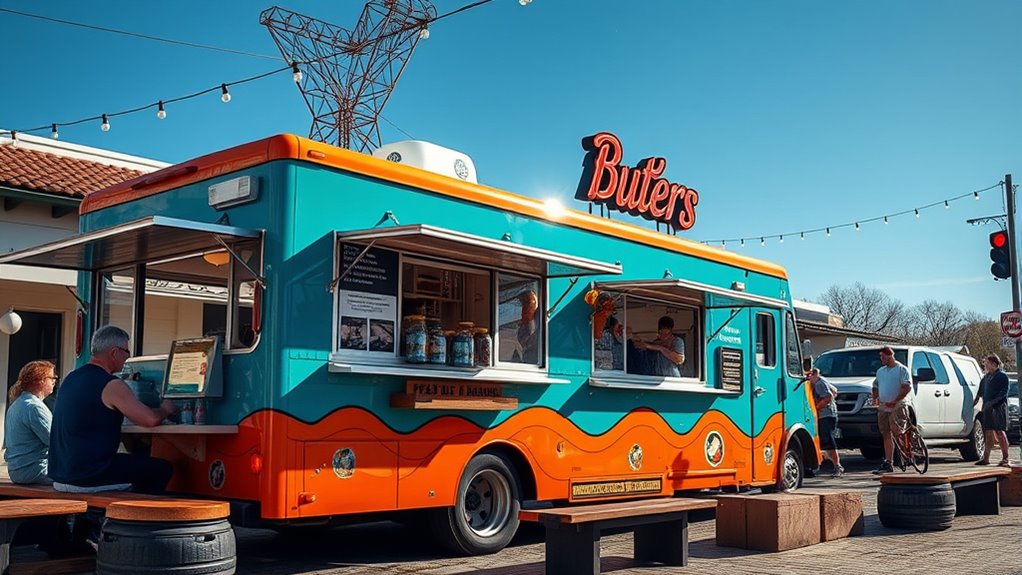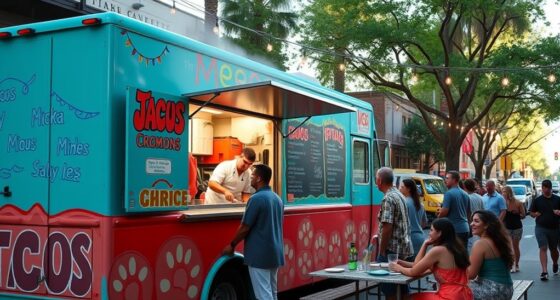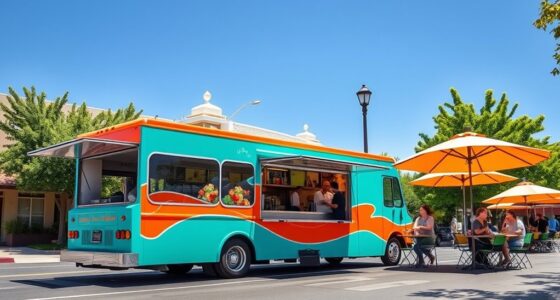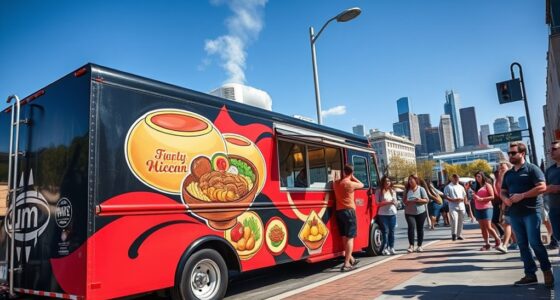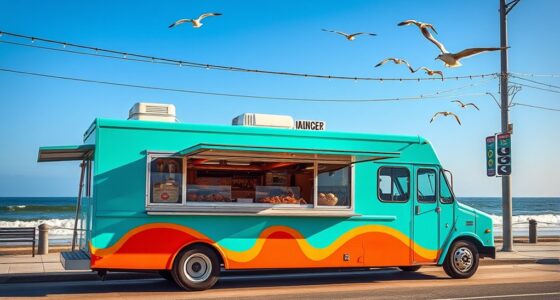To start your food truck in Chesapeake, VA, you’ll need to navigate local regulations, obtain permits via the online portal, and verify your kitchen meets health standards. Focus on building a strong community presence by partnering with local vendors, participating in events, and creating an eye-catching brand. Develop a menu inspired by Chesapeake flavors and incorporate technology like contactless payments. Continue exploring these steps to turn your food truck dream into reality.
Key Takeaways
- Develop a strong brand identity and engage with Chesapeake community events to boost visibility and foster local support.
- Obtain necessary permits via Chesapeake’s online portal and ensure compliance with sanitation and parking regulations.
- Invest in essential, durable kitchen equipment and plan budgets carefully, utilizing local grants when available.
- Implement contactless payment systems and real-time inventory software to streamline operations and improve customer experience.
- Build relationships with local vendors, community organizations, and event organizers to expand reach and grow your customer base.
Starting a Chesapeake Food Venture
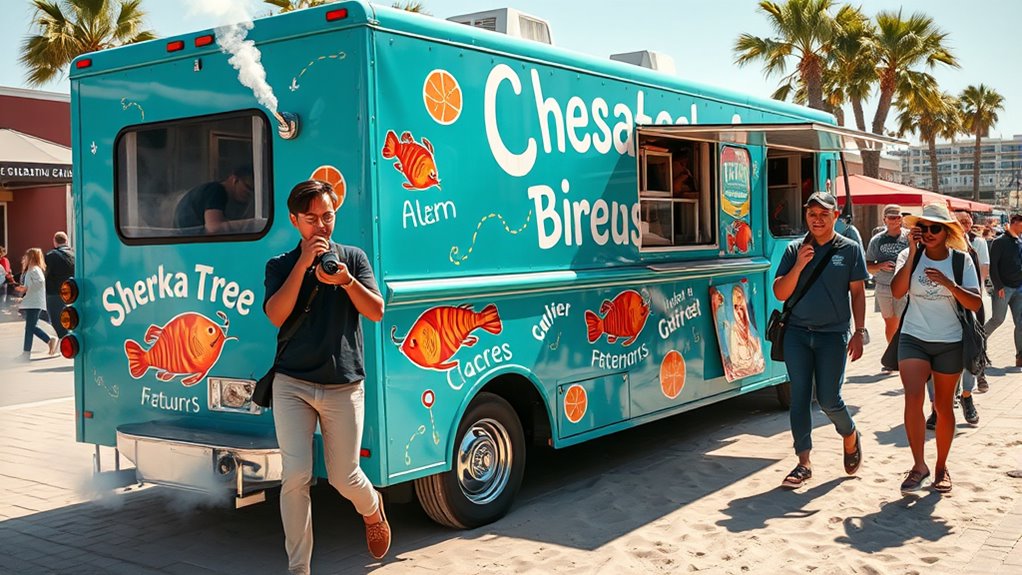
Starting a food venture in Chesapeake can be an exciting opportunity if you approach it with proper planning. One of your first steps is developing strong food truck branding that captures your unique style and appeals to local customers. Eye-catching signage, a memorable logo, and consistent messaging help attract attention and build recognition. Additionally, forming vendor partnerships is essential; collaborating with local suppliers ensures quality ingredients and reliable stock, which keeps your operations running smoothly. These relationships can also open doors to joint promotions and community events, boosting your visibility. Focus on creating a cohesive brand identity and nurturing vendor connections early on, setting a solid foundation for your Chesapeake food truck business to thrive. Incorporating inspirational quotes into your branding can motivate your team and resonate with customers, creating a positive and memorable experience.
Understanding Local Requirements
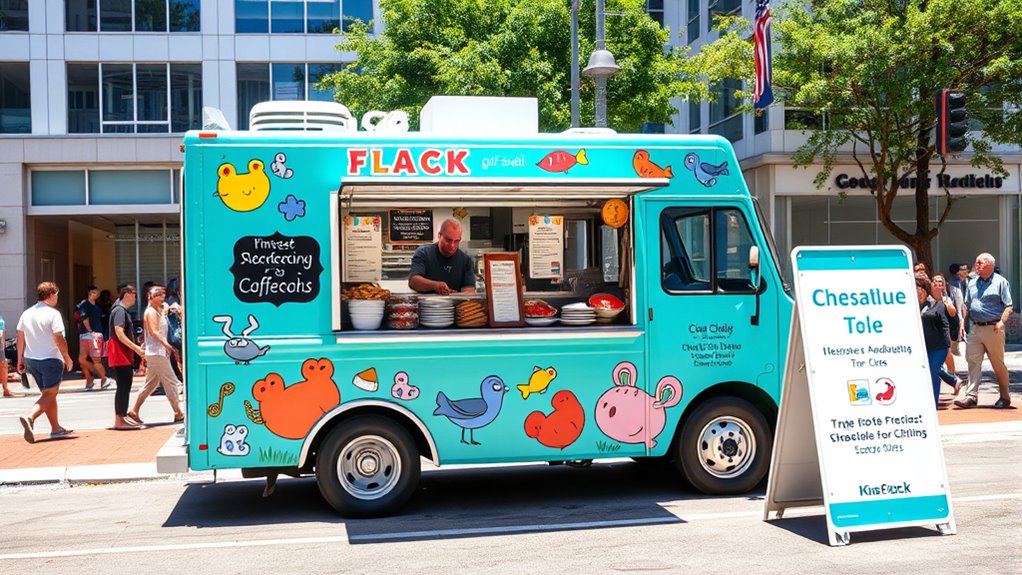
To get started, you’ll need to use Chesapeake’s online permit application portal to submit your paperwork effectively. Make sure you’re familiar with local sanitation standards to avoid violations that could delay your launch. Additionally, check the designated truck parking zones to ensure your food truck is parked legally and accessible to customers. Incorporating wall organization systems can help keep your food truck supplies organized and easily accessible.
Online Permit Application Portal
Guiding Chesapeake’s online permit application portal is a crucial step in launching your food truck business. This digital platform simplifies the process, saving you time and effort. By applying online, you can easily submit required documents, track your application status, and receive updates promptly. Understanding how the portal works helps you stay compliant with local regulations, ensuring a smooth startup process. Additionally, a well-established online presence supports your digital marketing efforts, attracting customers and boosting engagement. As you navigate the portal, keep in mind that clear, up-to-date information enhances your credibility and builds trust with your audience. Ultimately, mastering this step streamlines your permit acquisition and sets the stage for successful customer engagement from day one.
Sanitation Standards and Violations
After completing your online permit application, it’s important to familiarize yourself with Chesapeake’s sanitation standards to guarantee your food truck stays compliant. Maintaining proper food safety practices is essential for passing health inspections and avoiding violations. Chesapeake requires strict adherence to cleanliness, proper storage, and sanitation procedures. You must regularly sanitize surfaces, wash hands thoroughly, and keep food at safe temperatures. Failing to meet these standards can lead to fines or suspension of your permit. Be proactive by training staff on sanitation protocols and conducting routine self-inspections. Understanding local requirements helps you prevent violations that could harm your reputation and business. Staying compliant with sanitation standards isn’t just about passing inspections—it’s about ensuring the safety of your customers and the success of your food truck.
Designated Truck Parking Zones
Understanding where you can park your food truck is essential for staying compliant with Chesapeake’s local regulations. The city designates specific truck parking zones to ensure proper zone enforcement and safety. You must familiarize yourself with these designated areas, as parking outside approved zones could lead to violations and fines. Chesapeake’s parking regulations specify the exact locations where trucks are permitted, often near commercial districts, special event spaces, or designated curb sides. Always check local signage and zoning maps before parking. Adhering to zone enforcement policies helps avoid disruptions and keeps your business running smoothly. Remember, parking in non-approved areas can result in towing or penalties, so stay informed about the designated truck parking zones and follow the rules diligently.
Setting Up Your Base of Operations

To set up your base of operations, you’ll need to understand shared kitchen licensing requirements in Chesapeake and choose the right custom kitchen equipment. Ensuring your space meets local health codes is vital for smooth operation. Once you get these basics right, you’ll be ready to launch your food truck with confidence.
Shared Kitchen Licensing Requirements
Setting up your food truck in Chesapeake requires obtaining the appropriate shared kitchen license, which serves as your base of operations. To do this, you must comply with shared kitchen regulations that ensure food safety and proper sanitation. These regulations specify how your workspace must be maintained, including storage, cleanliness, and equipment standards. Managing licensing hurdles can be challenging, as you’ll need to submit detailed plans and pass inspections to prove your kitchen meets all health codes. It’s essential to work closely with local health authorities to understand the specific requirements. By securing the proper shared kitchen license, you establish a compliant and reliable base for your food truck operations, avoiding potential legal issues and setting yourself up for success.
Custom Kitchen Equipment Selection
Choosing the right kitchen equipment is essential for creating an efficient and compliant workspace for your food truck. Well-selected appliances streamline your food prep, helping you serve customers quickly and maintain high customer service standards. Focus on durable, easy-to-clean equipment to reduce vehicle maintenance issues and downtime. Consider space-saving appliances that maximize your limited truck area without sacrificing functionality. Prioritize items that support your menu, such as grills, fryers, and refrigeration units, ensuring they meet health and safety regulations. Properly installed and maintained equipment minimizes breakdowns and keeps your truck running smoothly. By investing in quality, you’ll enhance your operational efficiency, improve customer experience, and keep your vehicle in top shape for long-term success.
Budgeting and Financing Your Food Truck
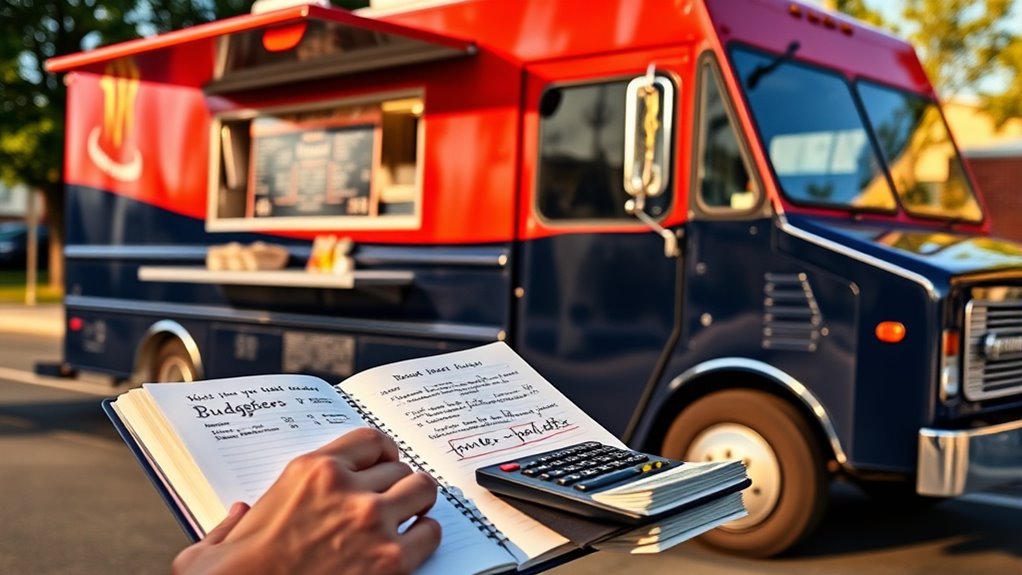
Budgeting your food truck startup involves understanding your initial costs, like kitchen equipment and vehicle insurance. You should also explore local small business grants that could help cover expenses. By planning carefully, you’ll set a solid financial foundation for your new venture. Additionally, considering the cost-effectiveness of eye patches as part of your promotional or self-care routines can enhance your personal well-being and project a polished image to customers.
Initial Investment in Kitchen Equipment
Securing the right kitchen equipment is a crucial first step, as it directly impacts your food truck’s efficiency and ability to serve quality dishes. Your initial investment should focus on a well-planned kitchen layout that maximizes space and workflow. Choose durable, reliable equipment to minimize maintenance costs and downtime. Consider essential appliances like grills, fryers, refrigerators, and prep stations that suit your menu. Keep in mind that proper equipment maintenance is key to longevity and consistent performance, so select units with easy access for cleaning and repairs. Budget wisely by comparing prices and prioritizing versatile, high-quality tools that meet your operational needs. A strategic investment now will streamline your daily operations and set a solid foundation for your food truck’s success.
Local Small Business Grants
Ever wondered how to finance your food truck without draining your savings? Local small business grants can be a game-changer. They provide funding that supports your food truck branding and social media marketing efforts, helping you stand out in Chesapeake. To tap into these opportunities, consider these steps:
- Research grants tailored for food entrepreneurs in your area
- Prepare a compelling business plan highlighting your branding strategy
- Gather necessary documentation and apply early
- Use awarded funds to boost your social media marketing campaigns and attract customers
Securing grants not only eases your financial burden but also boosts your confidence in launching your food truck. With the right funding, you can focus on creating a unique brand and engaging your audience online, setting the stage for success.
Vehicle Insurance Requirements
When planning your food truck’s finances, understanding vehicle insurance requirements is a key step. You’ll need to secure the right insurance policies to protect your investment and comply with Chesapeake regulations. Start by ensuring your vehicle registration is up to date, as it’s essential for obtaining insurance. Insurance policies for food trucks typically cover liability, collision, and all-encompassing damage, giving you peace of mind during daily operations. Shop around for coverage that fits your budget while meeting state and local requirements. Remember, proof of insurance is mandatory before registering your vehicle and launching your business. Investing in proper coverage now can save you money and headaches later, letting you focus on growing your food truck venture.
Designing Your Menu and Pricing Strategy
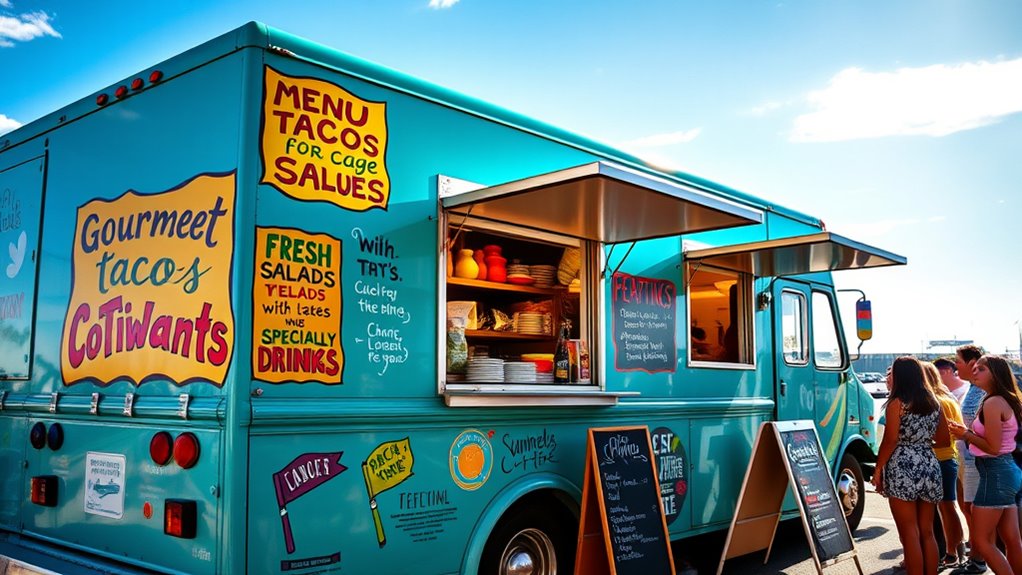
Your menu should showcase locally inspired fusion dishes that capture Chesapeake’s unique flavors, making your truck stand out. To keep your prices competitive, use cost control techniques like portion management and ingredient sourcing. Balancing appealing dishes with smart pricing will help attract customers and boost profits. Incorporating visualization and affirmations into your planning can also help clarify your goals and attract the right opportunities for success.
Locally Inspired Fusion Dishes
- Combine Chesapeake blue crabs with Asian-inspired spices for a spicy, savory crab bao.
- Infuse Southern barbecue flavors into Caribbean jerk chicken tacos.
- Use local oysters in a creative fusion oyster shooter with an Asian-inspired sauce.
- Incorporate regional herbs into Mediterranean-inspired wraps for a fresh, vibrant taste.
These approaches evoke emotion by celebrating local pride and culinary innovation, making your menu memorable and unique.
Cost Control Techniques
Designing a menu that highlights your fusion dishes while keeping costs manageable requires strategic pricing and thoughtful item selection. Focus on ingredient sourcing by choosing reliable suppliers who offer quality at a fair price, and consider seasonal ingredients to lower costs. Balance popular, profitable items with unique offerings to attract customers without overspending. Implement waste management practices to reduce food waste, which directly cuts costs. Use portion control to prevent overuse of ingredients and monitor inventory carefully to avoid spoilage. Price your menu items to reflect ingredient costs while remaining competitive. Regularly review sales data to identify high-margin dishes and adjust your menu accordingly. Efficiently managing ingredient sourcing and waste helps maximize profit margins and keeps your food truck financially healthy.
Technology and Operations

Using contactless payment options makes transactions faster and safer for your customers. Real-time stock tracking software helps you stay organized and avoid running out of popular items. Incorporating these technologies streamlines your operations and keeps your food truck efficient. Additionally, implementing softball strategies can enhance team coordination and overall performance.
Contactless Payment Options Available
Implementing contactless payment options can streamline your food truck’s transactions and enhance customer convenience. When you adopt contactless payments, you make cashless transactions quicker and safer, reducing wait times and increasing customer satisfaction. Imagine your customers feeling confident and secure as they simply tap their cards or smartphones to pay. This technology can:
- Boost your sales by accommodating faster turnarounds
- Improve hygiene, as handling cash decreases risks
- Attract tech-savvy customers seeking quick payments
- Reduce errors and cash handling hassles
Real-Time Stock Tracking Software
Real-time stock tracking software is essential for keeping your food truck operations efficient and responsive. With this technology, you can manage your inventory more accurately, ensuring you always know what’s in stock and what needs reordering. It streamlines inventory management by providing instant updates, reducing waste, and avoiding shortages. Additionally, it enhances supply chain logistics by allowing you to track ingredients and supplies as they arrive, preventing delays. This software helps you identify usage patterns and forecast demand, so you can plan purchases better. By integrating real-time stock data, you stay ahead of potential issues, improve operational flow, and deliver fresh, quality food consistently. Ultimately, investing in this technology boosts your efficiency and customer satisfaction, making your Chesapeake food truck more competitive and profitable.
Marketing and Growing Your Presence
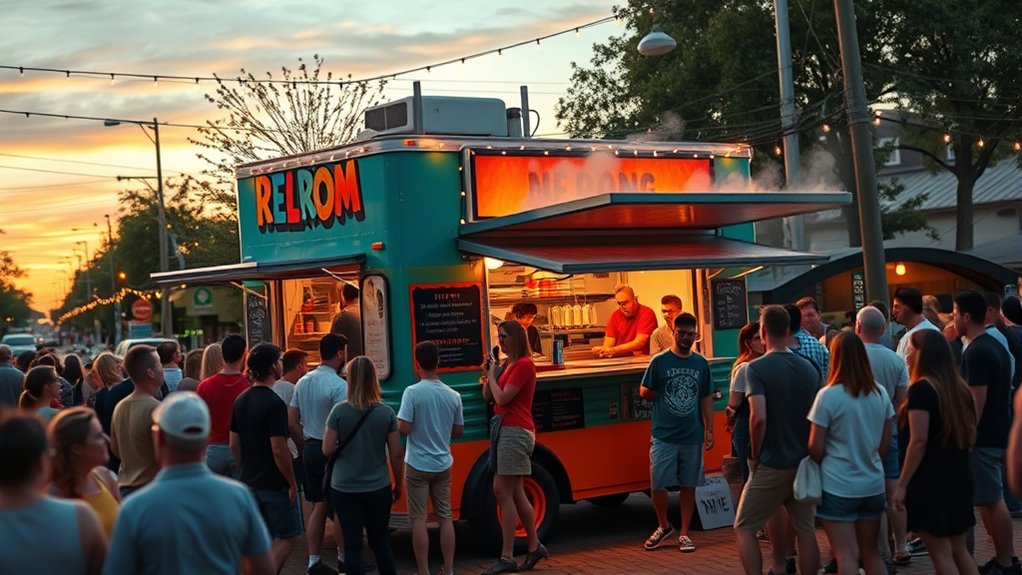
To grow your food truck’s presence, focus on popular local event venues where crowds already gather. Partnering with local foodies and collaborating on special events can boost your visibility and attract loyal customers. By actively engaging with the community, you’ll turn first-time visitors into regular fans.
Popular Local Event Venues
Partnering with popular local event venues is one of the most effective ways to boost your food truck’s visibility in Chesapeake. When you secure vendor partnerships at community festivals, markets, or outdoor concerts, you tap into a built-in audience enthusiastic to try new flavors. To stand out, invest in eye-catching food truck decor that complements the event vibe, making your truck memorable. Here are four ways to maximize this strategy:
- Build strong relationships with event organizers to secure prime spots.
- Customize your food truck decor to match the event theme, attracting attention.
- Offer exclusive menu items for special events to create buzz.
- Leverage vendor partnerships to cross-promote and expand your reach.
These efforts will elevate your presence and turn passersby into loyal customers.
Local Foodie Collaborations
Connecting with local foodies is a powerful way to build your food truck’s reputation and grow your presence in Chesapeake. Collaborate with community members by participating in food festivals, farmers’ markets, and local events. Focus on local ingredient sourcing to showcase Chesapeake’s fresh produce and unique flavors, which appeals to foodies seeking authentic experiences. Partnering with local chefs or food bloggers can amplify your reach and create buzz around your truck. Consider establishing community event partnerships to regularly feature your offerings and engage with the neighborhood. Use the table below to brainstorm ideas for collaborations:
| Local Ingredient Sourcing | Community Event Partnerships | Foodie Influencer Engagement |
|---|---|---|
| Farmers’ markets | Local festivals | Food bloggers |
| Local farms | Charity events | Social media influencers |
| Specialty suppliers | Cooking demos | Foodie meetups |
Chesapeake Food Truck Success
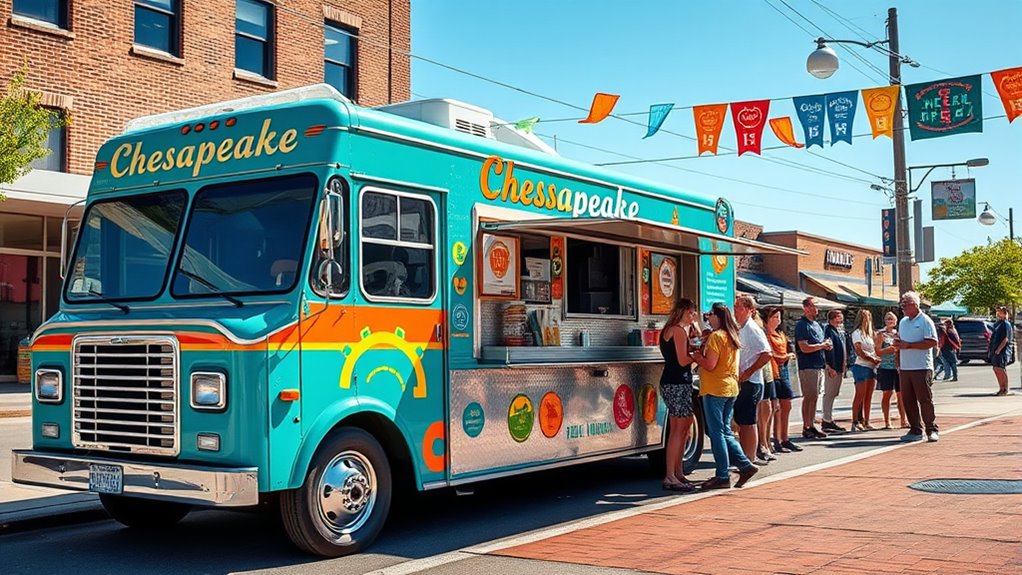
Chesapeake’s food truck scene has seen impressive growth, with many entrepreneurs turning their culinary visions into successful businesses. Your success depends on key factors like menu innovation and customer engagement. Consider these pivotal moments:
- You introduce a unique dish that captivates local tastes, boosting your reputation.
- You actively interact with customers, creating loyal fans who spread the word.
- You adapt your menu based on feedback, showing flexibility and care.
- You participate in community events, increasing visibility and building trust.
These steps foster a passionate customer base and set your truck apart. When you prioritize innovative menu offerings and genuine engagement, your Chesapeake food truck isn’t just a business—it’s a beloved part of the community.
Frequently Asked Questions
What Permits Are Specific to Chesapeake’s Food Truck Regulations?
You need to obtain specific food truck permits to comply with Chesapeake regulations. These include a mobile food unit permit, a health department permit, and possibly a special event permit if you plan to operate at festivals. Make sure to register your vehicle and meet all local health and safety standards. Contact the Chesapeake health department to guarantee you have all the necessary food truck permits and follow the regulations closely.
How Can I Find the Best Locations for My Food Truck in Chesapeake?
To find the best locations for your food truck in Chesapeake, focus on parking strategies that maximize visibility and accessibility. Scout areas with high customer foot traffic like busy parks, near office complexes, or event venues. Use local event calendars to identify gatherings. Talk to property managers for permissions. By observing foot traffic patterns and parking options, you can position your truck where it attracts the most customers daily.
Are There Any Local Food Truck Associations or Networks in Chesapeake?
Did you know that many Chesapeake food truck owners join local vendor alliances? Yes, there are food truck meetups and networks in Chesapeake that connect you with fellow vendors. These groups help you find events, share tips, and grow your business. Joining these associations makes it easier to access prime locations, collaborate with other vendors, and stay updated on regulations, boosting your chances of success in the local food scene.
What Are Common Challenges Faced by Chesapeake Food Truck Owners?
As a Chesapeake food truck owner, you often face challenges like fluctuating customer foot traffic that affects your sales. Equipment maintenance can also be tricky, requiring regular attention to guarantee your truck runs smoothly. Weather conditions, local regulations, and competition add to the complexity. Staying adaptable and maintaining your truck properly helps you overcome these hurdles, so you can focus on serving great food and growing your business in Chesapeake.
How Does Chesapeake’s Weather Impact Food Truck Operations Year-Round?
Chesapeake’s weather can be unpredictable, impacting your food truck operations year-round. You should plan for hot summers, which may require a seasonal menu with lighter, invigorating options, and prepare for colder months by offering warm dishes. Outdoor seating can attract customers during pleasant weather, but be ready to adjust your setup or operate indoors when rain or extreme cold hits, ensuring consistent service regardless of seasonal changes.
Conclusion
Starting your food truck in Chesapeake is like planting a seed in fertile ground. With each step—understanding requirements, crafting your menu, and building your brand—you nurture your dream into a thriving oasis. Stay dedicated, adapt to the flow of the market, and watch as your passion blossoms into a vibrant community gathering spot. Your journey is the sunrise, casting light on endless possibilities, turning your vision into a lasting beacon of success.
